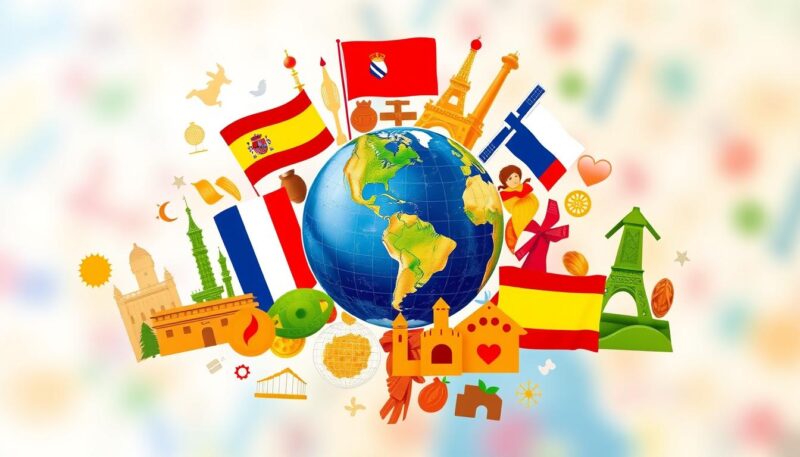Learning a new language can be a fulfilling and transformative journey, unlocking opportunities to connect with diverse cultures and enhance your personal and professional life. However, with thousands of options available, it’s essential to choose wisely when embarking on this adventure. For English speakers, some languages are considered easier to learn than others, primarily due to similarities in vocabulary and grammatical structure.
Research from the Foreign Service Institute (FSI) suggests that languages sharing a linguistic family with English or those that have straightforward rules can make learning feel seamless. In this article, we will explore the best languages for English speakers, focusing on those that offer an easier pathway to fluency. You’ll discover beginner-friendly languages that allow for quick language learning, making the process enjoyable and effective.
Join us as we delve into the options that will not only boost your language skills but also enrich your life adventures!
Understanding Language Learning for English Speakers
Embarking on a journey of language learning opens the door to new cultures, friendships, and opportunities. Your choice of language plays a pivotal role in shaping your experiences. Selecting a language closely related to English can significantly enhance your language education process. Languages such as Spanish, Dutch, and Norwegian are examples of easy languages for beginners, offering similarities in vocabulary and sentence structure that facilitate learning.
The Importance of Choosing the Right Language
Choosing the right language impacts your motivation and success. Languages that share common roots with English can streamline your learning path. For instance, Spanish is not only widely spoken but also accessible. The Foreign Service Institute estimates that it takes about 600 hours of dedicated study to achieve proficiency in Spanish. This timeframe is comparable for other easier languages, such as Dutch and Norwegian, which also require approximately 600 hours of study. By selecting a language that aligns with your interests and goals, you pave the way for a fulfilling learning experience.
Factors Influencing Language Learning Difficulty
Many factors influence language learning, creating unique challenges for each learner. The following table illustrates some key elements that can affect your experience:
| Language | Estimated Learning Time (Weeks) | Estimated Learning Time (Hours) |
|---|---|---|
| Spanish | 24 | 600 |
| Dutch | 24 | 600 |
| Norwegian | 24 | 600 |
| Swedish | 24 | 600 |
| Italian | 24 | 600 |
| Portuguese | 24 | 600 |
| Indonesian | 36 | 900 |
| German | 36 | 900 |
As seen in the table, languages vary in complexity and learning duration. Factors such as grammatical structure, vocabulary similarity, and available resources for practice can guide you in making the best choice for your personal learning journey. Understanding these elements will enhance your approach to mastering a new language, turning challenges into stepping stones toward fluency.
What is the Easiest Language to Learn for English Speakers? The Best Options
Language acquisition can be a rewarding journey, filled with new experiences and connections. For English speakers, recognizing which languages are easier to learn can streamline this process. In this section, we will explore the top languages that align with your goals, interests, and available resources, making your quick language learning experience more enjoyable.
Top Easiest Languages for English Speakers
Some of the top languages for English speakers include Norwegian, Spanish, Dutch, and Portuguese. Each offers unique characteristics that ease the path to fluency:
- Spanish: With around 30% of the U.S. population speaking Spanish fluently, cultural immersion provides endless opportunities for practice. Its straightforward grammar and vocabulary close to English make it a top choice.
- Norwegian: Sharing many common words with English, Norwegian presents a less complicated structure, allowing for quicker language acquisition.
- Dutch: As one of the most widely spoken Germanic languages after English and German, Dutch offers many similarities, enhancing language fluency.
- Portuguese: Rich in culture through music, films, and cuisine, Portuguese provides ample learning resources that motivate and excite learners.
Language Comparisons
The difficulty level of language learning varies among languages based on several factors. Below is a comparison of popular choices for English speakers:
| Language | Commonality with English | Hours to Proficiency |
|---|---|---|
| Spanish | High | 575-600 |
| French | High | 575-600 |
| Norwegian | Moderate | 575-600 |
| Dutch | Moderate | 575-600 |
| Portuguese | High | 575-600 |
| Swahili | Moderate | Approx. 36 weeks |
The Role of Language Resources
To achieve language fluency, utilizing the right learning resources significantly enhances your experience. Popular platforms like Duolingo and Coursera offer extensive materials for beginners to advanced learners. Active engagement through language exchange programs, such as Italki, connects you with native speakers, allowing for real-world practice. Selecting the best language to start with requires consideration of both your interests and the availability of effective learning resources.

Conclusion
As you embark on your language learning journey, the choice of the easiest language to learn for English speakers can significantly influence your experience. By selecting simple languages such as Spanish, French, or even the captivating sounds of Afrikaans, you’ll find that it becomes much easier to learn a language fast. These languages not only boast similarities in vocabulary and grammar but also offer a wealth of resources and engaging methods for practice.
Utilizing language learning tips tailored to your interests, such as immersive travel experiences or interactive language apps, can make the process enjoyable and effective. Whether you’re exploring the vibrant cultures associated with these languages or pursuing professional opportunities that require multilingual skills, the commitment to learning opens doors to enriching experiences. Languages for travelers especially enable you to connect more deeply with new places and people around the globe.
Ultimately, investing your time and resources into mastering a new language empowers you. It allows for richer connections and provides a sense of accomplishment that comes from overcoming challenges. So, embrace the adventure ahead as you navigate through the fascinating world of language learning!
